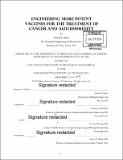| dc.contributor.advisor | Darrell J. Irvine and K. Dane Wittrup. | en_US |
| dc.contributor.author | Mehta, Naveen K.,Ph.D.Massachusetts Institute of Technology. | en_US |
| dc.contributor.other | Massachusetts Institute of Technology. Department of Biological Engineering. | en_US |
| dc.date.accessioned | 2019-11-22T00:09:22Z | |
| dc.date.available | 2019-11-22T00:09:22Z | |
| dc.date.copyright | 2019 | en_US |
| dc.date.issued | 2019 | en_US |
| dc.identifier.uri | https://hdl.handle.net/1721.1/123065 | |
| dc.description | Thesis: Ph. D., Massachusetts Institute of Technology, Department of Biological Engineering, 2019 | en_US |
| dc.description | Cataloged from PDF version of thesis. | en_US |
| dc.description | Includes bibliographical references (pages 171-181). | en_US |
| dc.description.abstract | Vaccination against infectious diseases has long been heralded as one of the greatest advancements in public health, yet its application to other clinical indications has fallen short of expectations. In this thesis, we apply engineering principles to develop more potent vaccines in the treatment of cancer and autoimmunity. Both major components of molecular vaccines, antigen and adjuvant, are independently explored as a part of this work. Our antigen studies sought to improve the delivery of peptide epitopes to lymphoid organs by fusing epitopes to inert protein carriers with defined pharmacokinetic properties. To promote anti-tumor immunity, we found that antigen carriers should 1) protect peptide cargo from proteolytic degradation, 2) be appropriately bulky to drain into the lymphatics, and 3) be rapidly cleared once in the blood to prevent tolerization at distal poorly inflamed organs. | en_US |
| dc.description.abstract | Applying these principles, we identified transthyretin as an optimal delivery protein, and demonstrated efficacy against a number of clinically relevant antigens. Because our protein-epitope fusion approach is fully recombinant in nature, we were able to convert our protein vaccines into nucleic acid modalities, including plasmid DNA and self-replicating RNA, which are significantly easier and cheaper to manufacture at scale. Finally, we applied our learnings to purposefully induce tolerization in the treatment of autoimmunity, and found that albumin is a particularly efficacious antigen carrier protein for this application due to its extended half-life. On the adjuvant front, we attempted to engineer novel Toll-like receptor 3 (TLR3) agonists via yeast surface display. Although we successfully developed high affinity TLR3 binders, all tested clones failed to agonize TLR3 despite the utilization of several multimerization strategies. | en_US |
| dc.description.abstract | Separately, in an effort to better understand adjuvant biology, we conducted a detailed mechanistic study of lipo-CpG, a particularly potent amphiphilic CpG variant previously developed by the Irvine lab. We uncovered a cascade of inflammatory signals originating from monocytes that facilitates the induction of high magnitude T cell responses, largely by acting in trans rather than directly on the antigen-presenting cell. Overall, these studies have elucidated a number of design principles that should aid in the engineering of next generation vaccines to better treat cancer and autoimmunity. | en_US |
| dc.description.statementofresponsibility | by Naveen K. Mehta. | en_US |
| dc.format.extent | 181 pages | en_US |
| dc.language.iso | eng | en_US |
| dc.publisher | Massachusetts Institute of Technology | en_US |
| dc.rights | MIT theses are protected by copyright. They may be viewed, downloaded, or printed from this source but further reproduction or distribution in any format is prohibited without written permission. | en_US |
| dc.rights.uri | http://dspace.mit.edu/handle/1721.1/7582 | en_US |
| dc.subject | Biological Engineering. | en_US |
| dc.title | Engineering more potent vaccines for the treatment of cancer and autoimmunity | en_US |
| dc.type | Thesis | en_US |
| dc.description.degree | Ph. D. | en_US |
| dc.contributor.department | Massachusetts Institute of Technology. Department of Biological Engineering | en_US |
| dc.identifier.oclc | 1127291776 | en_US |
| dc.description.collection | Ph.D. Massachusetts Institute of Technology, Department of Biological Engineering | en_US |
| dspace.imported | 2019-11-22T00:09:21Z | en_US |
| mit.thesis.degree | Doctoral | en_US |
| mit.thesis.department | BioEng | en_US |
